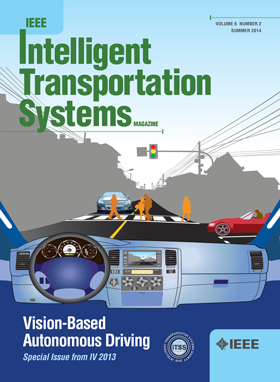Optimization of Regenerative Braking Control Strategy for Dual-Motor Electric Vehicles Based on Deep Reinforcement Learning
IF 8.4
1区 工程技术
Q1 ENGINEERING, CIVIL
IEEE Transactions on Intelligent Transportation Systems
Pub Date : 2025-04-15
DOI:10.1109/TITS.2025.3553875
引用次数: 0
Abstract
In order to maximize the braking energy recovery of dual motor-driven electric vehicles to guarantee braking safety and comfort, this paper proposes a Deep Reinforcement Learning (DRL) braking energy recovery strategy with an improved prioritized experience replay and exploration mechanism. Firstly, the energy recovery process of the electric vehicle is analyzed, and a mathematical model reflecting the dual-motor braking energy conversion and constraint characteristics is established. Secondly, an energy recovery decision-making framework is established based on the twin delayed deep deterministic policy gradient (TD3) algorithm, and an improved prioritized experience replay policy is designed to address the problem of inefficient empirical sampling in the traditional TD3. Finally, in order to change the imbalance between exploration and utilization that exists in the deterministic policy approach, an exploration policy that is automatically adjusted with the training process is introduced to enhance the algorithm’s decision-making ability in complex environments. The effectiveness of the proposed strategy was verified using a Matlab/Simulink simulation model under China Light Vehicle Test Cycle (CLTC) and World Light Vehicle Test Cycle (WLTC) operating conditions. The results showed that the proposed method exhibits higher efficiency in braking energy recovery when compared to other algorithms, with energy recovery efficiencies of 35.18% and 25.79% under two operating conditions, which both met the braking comfort and safety targets.基于深度强化学习的双电机电动汽车再生制动控制策略优化
为了使双电机驱动电动汽车制动能量回收最大化,保证制动安全性和舒适性,本文提出了一种基于深度强化学习(Deep Reinforcement Learning, DRL)的制动能量回收策略,该策略采用改进的优先体验回放和探索机制。首先,分析了电动汽车的能量回收过程,建立了反映双电机制动能量转换和约束特性的数学模型;其次,建立了基于双延迟深度确定性策略梯度(TD3)算法的能量回收决策框架,针对传统TD3算法经验采样效率低的问题,设计了改进的优先体验重播策略;最后,为了改变确定性策略方法中存在的探索与利用不平衡的问题,引入了一种随训练过程自动调整的探索策略,增强了算法在复杂环境下的决策能力。在中国轻型车试验周期(CLTC)和世界轻型车试验周期(WLTC)工况下,通过Matlab/Simulink仿真模型验证了该策略的有效性。结果表明,与其他算法相比,该方法具有更高的制动能量回收效率,两种工况下的能量回收效率分别为35.18%和25.79%,均满足制动舒适性和安全性目标。
本文章由计算机程序翻译,如有差异,请以英文原文为准。
求助全文
约1分钟内获得全文
求助全文
来源期刊

IEEE Transactions on Intelligent Transportation Systems
工程技术-工程:电子与电气
CiteScore
14.80
自引率
12.90%
发文量
1872
审稿时长
7.5 months
期刊介绍:
The theoretical, experimental and operational aspects of electrical and electronics engineering and information technologies as applied to Intelligent Transportation Systems (ITS). Intelligent Transportation Systems are defined as those systems utilizing synergistic technologies and systems engineering concepts to develop and improve transportation systems of all kinds. The scope of this interdisciplinary activity includes the promotion, consolidation and coordination of ITS technical activities among IEEE entities, and providing a focus for cooperative activities, both internally and externally.
 求助内容:
求助内容: 应助结果提醒方式:
应助结果提醒方式:


